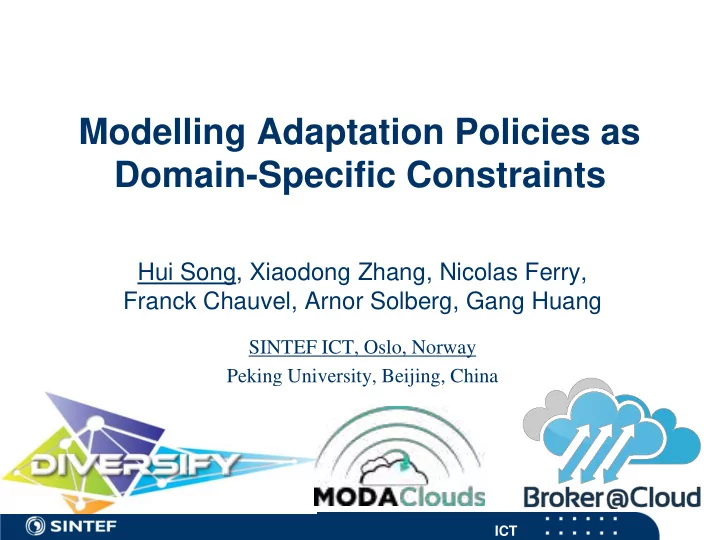

Modelling Adaptation Policies as Domain-Specific Constraints Hui Song, Xiaodong Zhang, Nicolas Ferry, Franck Chauvel, Arnor Solberg, Gang Huang SINTEF ICT, Oslo, Norway Peking University, Beijing, China ICT
VM Placement in Cloud vm applications ICT 2
Thinking in Models mysql mysql web Resource limitation vm1 vm2 vm3 Consolidation core=8 core=8 core=4 mem=6 mem=8 mem=4 Backup split ? Frequent close pm1 pm2 Migration cost core=8 core=4 mem=20 mem=10 ICT 3
Developing the Adaptation Behaviour frequent backup Concentrate VMs to fewer pms to save energy comm mysql mysql web but only when the sum of VMs’ memory does not exceed the pms ’ memory vm1 vm2 vm3 Don’t move very big VMs core=8 core=8 core=4 Separate backup VMs to different PMs mem=6 mem=8 mem=4 But only when the sum of VMs’ memory… Don’t move very big… Concentrate VMs…, when possible pm1 pm2 core=8 core=4 Put frequently communicating VMs closer mem=20 not close mem=10 Separate backup VMs… But only when the sum… Don't move very big… Concentrate… … if backup(vm1,vm2) and vm1.host = vm2.host, if vm1.mem < vm2.mem or ( frqt(vm1, vm2) and not vm1.mem >> vm2.mem ) if vm2.mem < pm2.available and vm1.core <= pm2.core move vm1 to pm2 If written in Action-based adaptation policy else … ICT 4
Modelling Adaptation Policies Challenges Many interrelating concerns Actions policies (if-then-else or event-condition-action)? Explosion of branches Hard to introduce new concerns Abstraction gap between concerns and actions New way of modeling! Just write down the constraints themselves "what the system should be like" rather than "how to achieve that” Potential conflicts? Soft constraints with different weights ICT 5
Modeling Adaptation Policies as Constraints Memory Limitation context PM inv : hosting->collect(mem)->sum() <= mem (priority: mandatory) Consolidation context PM inv : self .hosting->size() = 0 (priority: low) Backup split: context VM inv : backup->forall(e|e.plc != self.plc) (priority: high) Migration cost: vm1.plc = pm1 (priority: 8) Vm3.plc = pm2 (priority: 4) ICT 6
Constraint Modelling Language and Editor https://bitbucket.org/huis/constraintml ICT 7
Adaptation Based on Constraints main contents in this paper CSP (SMT) transformation language constraint transform solving adaptation model - concepts instance instance - constraints model model' m@rt system domain experts ICT 8
Satisfactory Modulo Theory Memory Limitation context PM inv : hosting->collect(mem)->sum() <= mem ICT 9
Transformation ICT 10
Constraint Solving Constraint Solver: Is there an interpretation to each function, to satisfy all the constraints? Yes: Return the interpretation, No: Ignore some "weakest" constraints, and return an interpretation to satisfy all the others – An optimisation problem Solver: Z3 by Microsoft research Song, H., S. Barrett, A. Clarke, and S. Clarke (2013). Self-adaptation with End-User Preferences: Using Run- Time Models and Constraint Solving. In: Model-Driven Engineering Languages and Systems. pp.555 – 571. ICT 11
models@runtime frequent frequent backup backup comm comm mysql mysql web mysql mysql web vm1 vm2 vm3 vm1 vm2 vm3 core=8 core=8 core=4 core=4 core=8 core=4 mem=6 mem=8 mem=4 mem=6 mem=8 mem=4 pm1 pm2 pm1 pm2 core=8 core=4 core=8 core=4 mem=20 not close mem=10 mem=20 not close mem=10 Nicolas Ferry, Hui Song, Alessandro Rossini, Franck Chauvel and Arnor Solberg, CloudMF: Applying MDE to Tame the Complexity of Managing Multi-Cloud Applications, UCC 2014, to appear ICT 12
A Demo Focus on the adaptation effect Ignore SMT generation and models@runtime ICT 13
Performance Acceptable for medium sized private clouds 60s: 100 vm, 10 pm, 600 properties, 10 changes (as in paper) 60s: 500 vm, 50pm, 3000 properties, 10 changes (now) Why Powerful new constraint solver 127 Usually simple constraints 63 A big portion of fixed properties Adaptation time (s) 31 Partial evaluation! 15 7 3 1 #1 #2 #3 #4 #5 #6 ICT 14
A Short Summary • • SMT represention of architectural models SMT solving with soft constraints • • OCL to SMT transformation, with partial Conflicting constraints • evaluation Adaptation costs • Declarative constraint- based modelling • A text-based DSL with a powerful editor ICT
Application Directly used for adaptation Constraints from cloud domain experts Searching for better deployment that fits the context better Assessment of adaptation cost "Is a diverse system easier to be adapted for changing contexts"? "Dry-run" the solving process on controlled models The total weight of broken constraints is the cost of performing the adaptation ICT 16
Thank You! Questions, Comments, Suggestions? Constraints SINTEF ICT Constraint Solver hui.song@sintef.no https://github.com/songhui/cspadapt ICT 17
Recommend
More recommend